Anime is a great and super fun way to learn Japanese. Picking up random words and short phrases from anime is one of the first steps to learning Japanese and building interest in taking up proper Japanese lessons. Singular words aside, what common anime phrases can you actually use in real life?
Header Image Credit: ©赤坂アカ/集英社・かぐや様は告らせたい製作委員会 / ©遠藤達哉/集英社・SPY×FAMILY製作委員会 / ©2018 大武政夫・KADOKAWA刊/ヒナまつり製作委員会
Table of Contents
- Anime Phrases that You Can Use in Real Life
- Common Anime Phrases in Specific Situations
- 5 Popular Anime Phrases Everybody Know and You Should Too
- Takeaway
Anime Phrases that You Can Use in Real Life
1. ドキドキ Doki Doki
You probably know doki doki well from watching shoujo romcom anime. Doki doki is the Japanese version of “thump thump” for the sound of a beating heart. You can usually see it in manga as an SFX.

It can also mean (heart) beating fast, (heart) pounding, (heart) throbbing. 💓 Pretty much said or thought by every love interest in romance anime:

「胸がまだドキドキしている」
Mune ga mada doki doki shiteiru
- My heart is still pounding.
「彼女のことを考えると心臓がドキドキする」
Kanojo no koto wo kangaeru to shinzou ga doki doki suru
- My heart starts pounding whenever I think of her.
2. ワクワク Waku Waku
📺メディア情報📺
— 『SPY×FAMILY(スパイファミリー)』アニメ公式 (@spyfamily_anime) May 16, 2022
本日21時から放送の
「CDTVライブ!ライブ!」にて、#星野源 さんが #喜劇 をフルサイズで
TV初披露🎉✨
皆様、放送をお楽しみに‼️
詳細はこちら🔽https://t.co/jzEOoCI97a#SPY_FAMILY#スパイファミリー#星野源喜劇 pic.twitter.com/2ypLV8ms3S
Waku waku means excited or thrilled. It’s most famously said by Anya Forger from the hit anime SPY x FAMILY. Anya exclaims waku waku spiritedly whenever she’s excited, like when discovering her parent’s hidden identities and when watching her favourite spy cartoon.
"Spy… mission… waku waku! "
A-assassin?!
Spy… assassin…
Anya….waku waku!
- Anya Forger, SPY x Family
Suddenly going “waku waku” outright is pretty cringe, but you can use it normally in sentences to express your excitement for something:
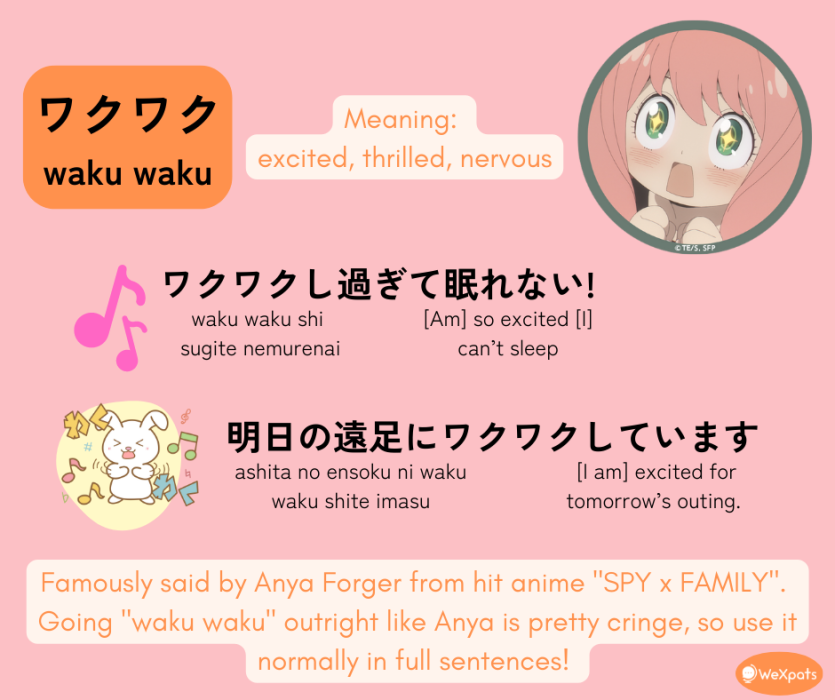
「明日の遠足にワクワクしています。」
Ashita no ensoku ni waku waku shite imasu.
- [I am] excited for tomorrow’s outing.
「ワクワクし過ぎて眠れない!」
Waku waku shi sugite nemurenai!
- [ am] so excited [I] can’t sleep!
3. あいったー A ittaa
あいったー x20+
ああ、私のスマホがあああー
Aa, watashi no sumaho gaaaa-
Aa, my smartphoneeeeeee...
- Random monks getting beat up, Hinamatsuri
「あいったー」comes from comedy gag anime Hinamatsuri about Hina, a girl with powerful supernatural powers who crash lands (literally) into Yakuza member, Nitta Yoshifumi’s life. Hilarity and chaos ensues in their daily lives.
Whenever someone gets hurt or beaten up in this anime, their expressions of pain comes in the form of 「あいったー」which is short form of 「ああ、痛い」, or “Ah, it hurts” or more literally “Ah, pain”. This is used a lot, and I mean a lot in the anime, so much so that あいったー Twitter icons were released to commemorate the anime’s official Twitter hitting 100,000 followers.
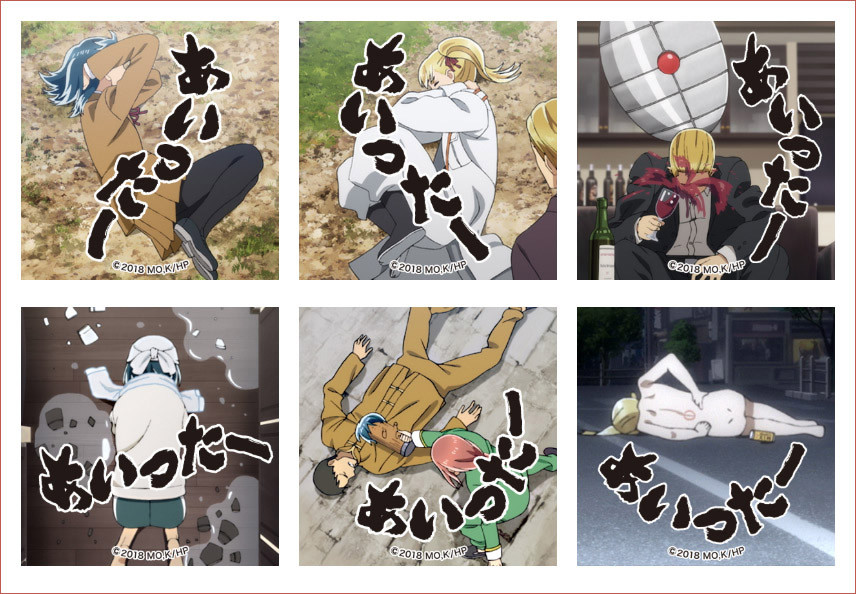
Image Credit: ©2018 大武政夫・KADOKAWA刊/ヒナまつり製作委員会
As an exclamation of pain, “A ittaa” can be used simply as it is, simply meaning “ouch”. Other variations include “Itte!”, “A ittee”, or even “Itte-te-te-te!” when the pain is drawn out.
4. むかつく Mukatsuku
Mukatsuku is just one of many other Japanese anime phrases to express irritation, anger, frustration and dissatisfaction. Others include 頭にきた (atama ni kita) frequently said by Tohsaka Rin from Fate series, and 腹が立つ (hara ga tatsu). You’ve probably heard mukatsuku being used in anime like so:
「アンタマジでムカツク!」
Anta de maji de mukatsuku!
- You really p*** me off / You really get on my nerves!
「あいつむかつく」
Aitsu mukatsuku.
- He’s annoying / He p***es me off / He gets on my nerves.
(Depending on context, can have different meanings or carry different weight. For example, it can be used when you really don’t like someone which carries negative feelings; at the same time, it can be used when you’re grumbling / sulking over a friend who keeps beating you in a game which doesn’t necessarily mean you hate your friend, more like “Aargh, he keeps beating me!”)
「(ああ、)むかつく」
(aa), mukatsuku
- Argh. (Fed up/Annoyed with the situation.)
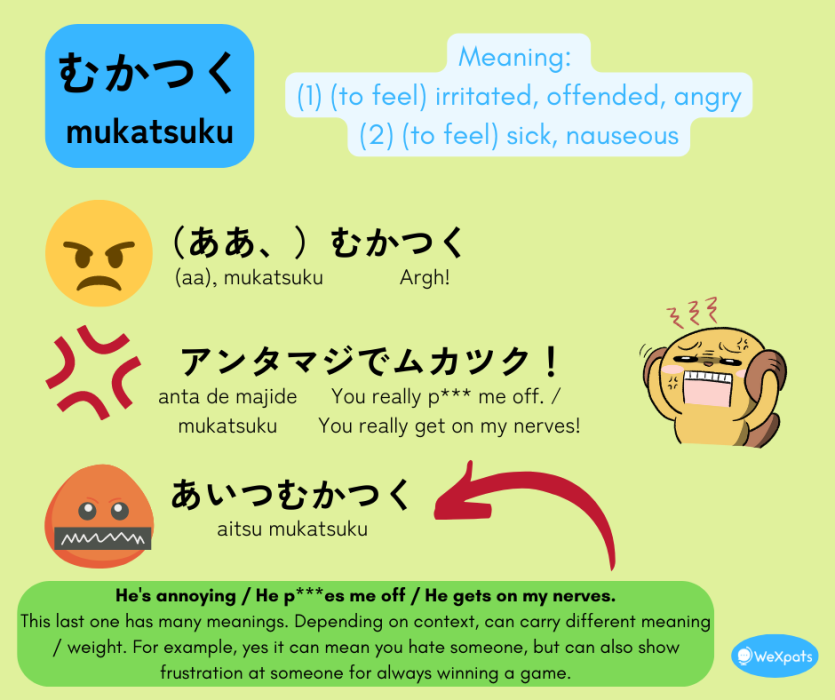
Aside from outright saying “I’m p***ed” in anime and manga, the anger mark 💢, smoke coming out of ears / nostrils, or swirly swirls beside the head are other common signs of anger in anime and manga.
5.(ちょっと)待ってください(Chotto)Mattekudasai
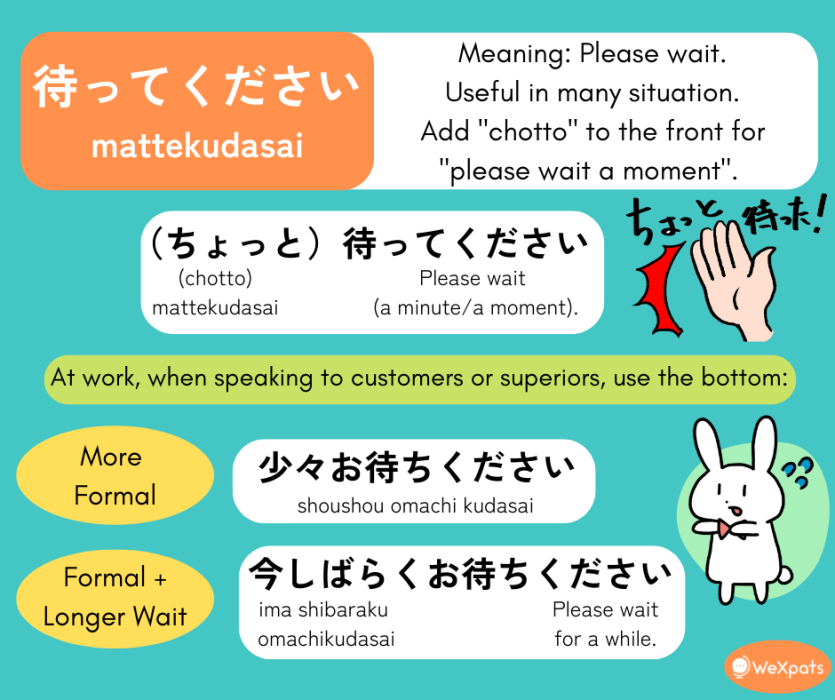
This phrase is super useful to learn as it’s used quite frequently in Japan. It can be used in all situations from school, at work, on the phone, and even when paying at the cashier when you’re digging through your purse for cash.
「(ちょっと)待ってください」
(Chotto)Mattekudasai
- Please wait (a moment / a minute).
At work, when speaking to your superiors or customers, try to use the more formal version of the phrase which is,
「少々お待ちください。」
Shoushou omachi kudasai.
Or this if you’re expecting them to wait more than “a little”.
「今しばらくお待ちください。」
Ima shibaraku omachi kudasai.
- Please wait for a while.
6. めんどくさい Mendokusai
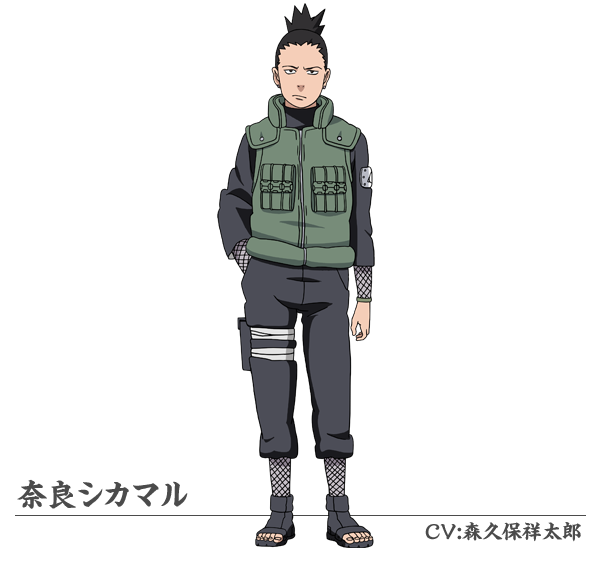
Image Credit: © 岸本斉史 スコット/集英社・テレビ東京・ぴえろ/ © TV TOKYO Corporation
めんどくさいけどやるしかねえな。
Mendokusai kedo yaru shikanee na.
What pain but there's no choice but to do it.
- Nara Shikamaru, Naruto / Naruto Shippuden
Shikamaru from Naruto and Gintoki from Gintama are probably the most memorable characters when it comes to “mendokusai”, especially Shikamaru whose lines in Naruto always includes the word.
Mendokusai is used to express feelings of reluctance to do something because it’s too troublesome or tiresome. We totally get that feeling though. Classic examples include:
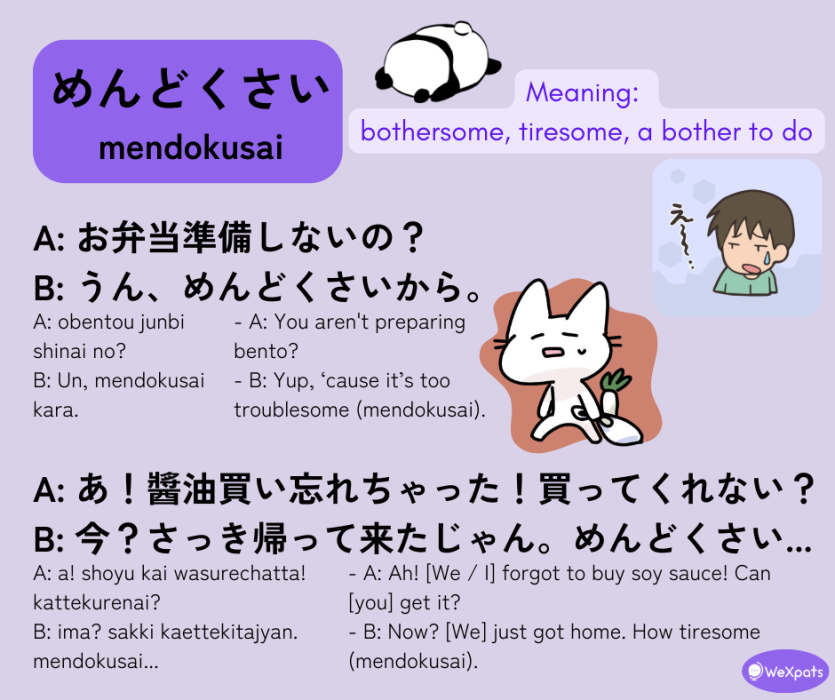
A: お弁当準備しないの?
B: うん、めんどくさいから。
- A: You aren't preparing bento?
- B: Yup, ‘cause it’s too troublesome (mendokusai).
A: あ!醬油買う忘れちゃった!買ってくれない?
B: 今?さっき戻ったじゃん。めんどくさい...
- A: Ah! [We / I] forgot to buy soy sauce! Can [you] get it?
- B: Now? [We] just got home. How tiresome (mendokusai).
「宿題するのはめんどくさい」
Shukudai suru no wa mendokusai.
- Doing homework is troublesome / tiresome / such a pain.
7. 最悪・最高 Saiaku・Saiko
Saiaku means bad or the worst, it is used to describe many things including horrible situations and bad things. Saiaku is frequently used in anime like so:
「これ...最悪な状況だ」
Kore.. saiaku na jyoukou da.
- This… is a horrible situation / This is a nightmare.
「最悪な結果はみんなが死ぬ」
Saiaku na kekka ha minna ga shinu.
- The worst case scenario, we all die.
You definitely know famous anime Attack on Titan, it’s not wrong to say that every time a titan attack happens is pretty much a 「最悪な状況」, “worst possible situation”, for the human race.
Opposite side of the spectrum is Saiko or simply Besuto (as in “best”). Technically, Saiko’s opposite words is Saitei (最低) which though similar in meaning to Saiaku is used differently, most commonly being to insult someone for being the worst - 「お前最低だ。」”You’re the worst / despicable”. Examples of Saiko:
「この山からの景色が最高です。」
Kono yama kara no keshiki ga saikou desu.
- The view from this mountain is the best.
「お前たち、本当に最高だぜ!」
Omae-tachi, hontou ni saiko daze!
- You guys are really the best!
8. しょうがない・仕方ない Shouganai・Shikatanai
Both Shouganai and Shikata can mean many things:
-
It can’t be helped.
-
It is what it is.
-
Oh well.
-
There’s nothing you can do.
-
There’s nothing that can be done.
Tone is important when using this phrase! Depending on your tone of voice, it can come across as comforting or just telling someone to give up! Note that shikatanai is a more formal version than shouganai.
Some examples of shoganai used in everyday life in Japan:
-
Child drops ice cream and starts crying. Mom goes,
「あらあら、落ちてしまった。泣かないよもう、しょうがないでしょう。」
Ara ara, ochite shimatta. Nakanai yo mou, shouganai deshou.
- Oh dear, [ice cream] dropped. Don’t cry, there’s nothing that can be done. -
No choice but to do something.
「めんどくさいでもしょうがない...」
Mendokusai de mo shouganai…
- [It’s] troublesome but there’s no choice [but to do it]...
9. 任せとけ Makasetoke
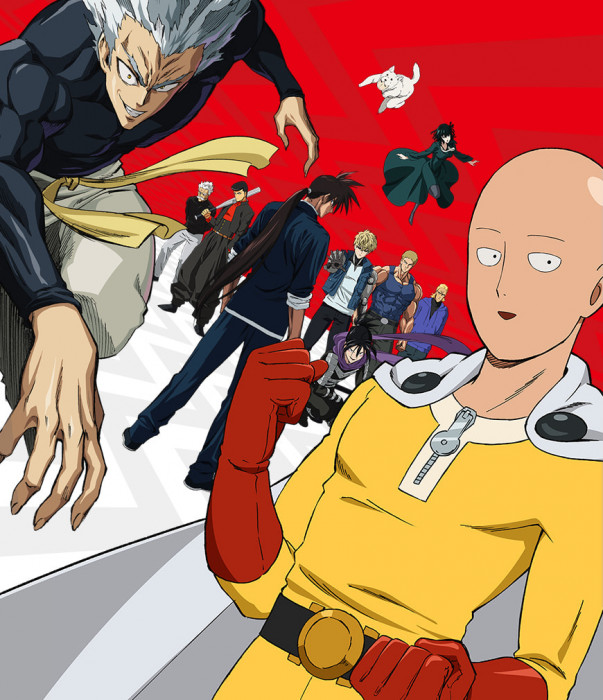
Image Credit: ©ONE・村田雄介/集英社・ヒーロー協会本部
Makasetoke means leave it to me. You'll often hear this phrase in anime with heroes, or characters with a strong sense of responsibility, or a slow-developing character with something to prove. And usually said in a loud firm voice laced with conviction.
ママに任せて!
Mama ni makasete!
Leave it to mama!
- Fujiwara Chika, Kaguya-sama
よく一人で耐えたな。 後は任せとけ!
Yoku hitori de taetana. Ato ha makasetoke!
You hung in there well. Leave the rest to me!
- Saitama, One Punch Man
俺に任せてくれ。
Ore ni makasete kure.
Leave it to me.
- Uzumaki Naruto, Naruto Shippuden
In real life, it’s better to add on kudasai at the end to make it
「任せてください」
Makasetekudasai.
- Please leave it to me.
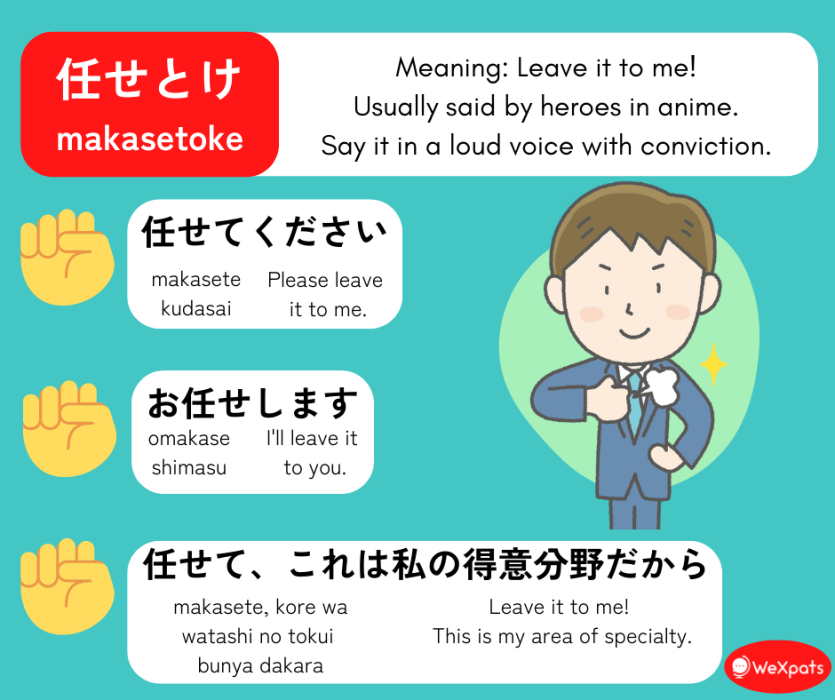
10. すごい Sugoi
Sugoi, simple enough, means amazing. It can be used stand alone, something like “Wow!” It is used to express excitement or amazement. Variations of sugoi include “Sugee” or more formally “Sugoi desu”. Just like in anime, sugoi is a flexible word that can be used in many real life situations.
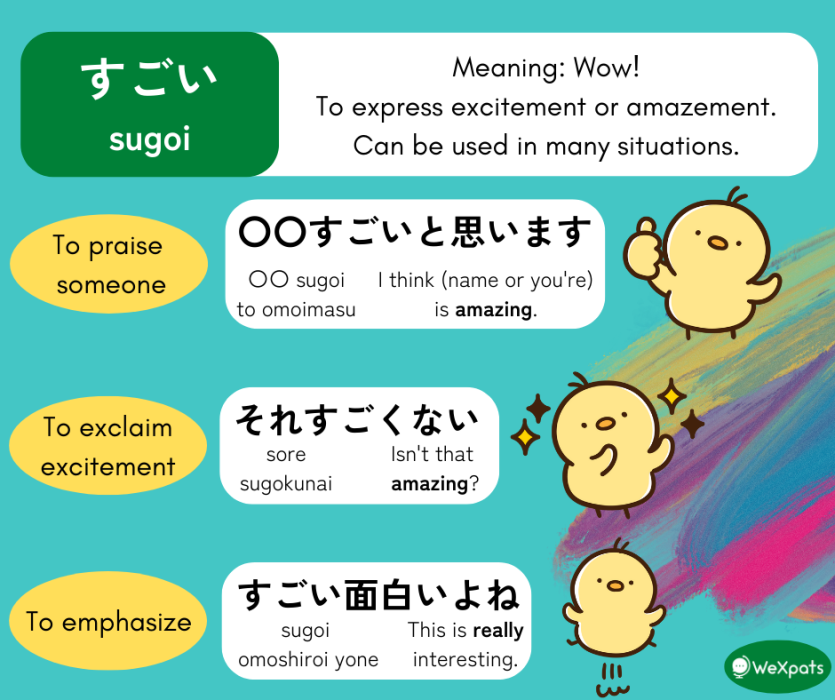
To praise someone,
「〇〇すごいと思います。」
〇〇 sugoi to omoi masu.
- I think you’re amazing.
to exclaim excitement and amazement,
「それすごくない」
Sore sugoku nai.
- Isn’t that amazing?
to emphasize, and more.
「すごい面白いよね」
Sugoi omoshiroi yo ne.
- This is really interesting.
Common Anime Phrases in Specific Situations
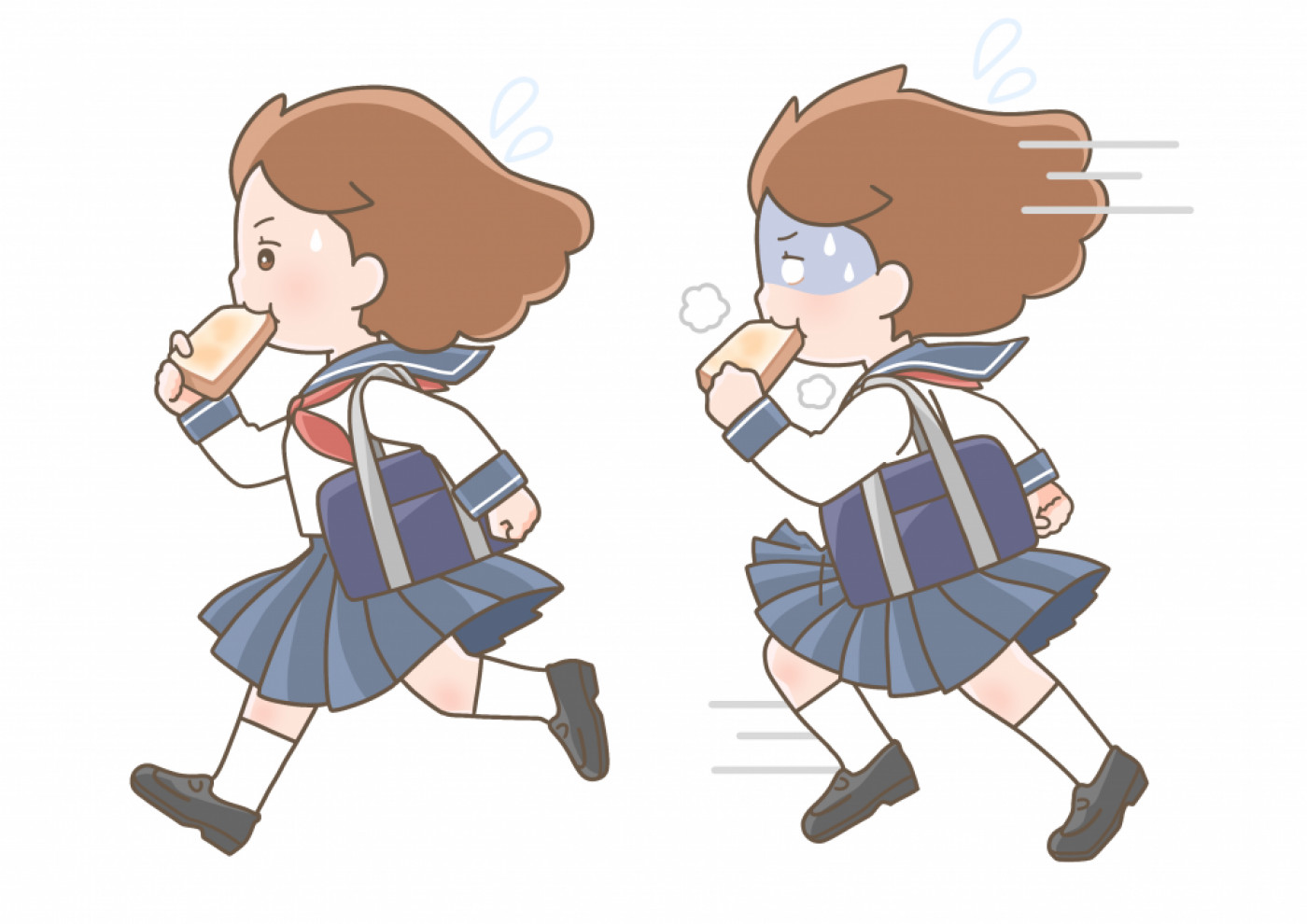
11. Everyday Greetings
Everyday greetings like hello and goodbye are commonplace in anime, they’re really easy to pick up being short and usually not part of other sentences. Just from watching anime, many non-Japanese speakers can learn simple greetings like ohayou, oyasumi, konnichiwa, and more.
12. Ganbatte (kudasai) ・Ouen (shimasu / suru yo)
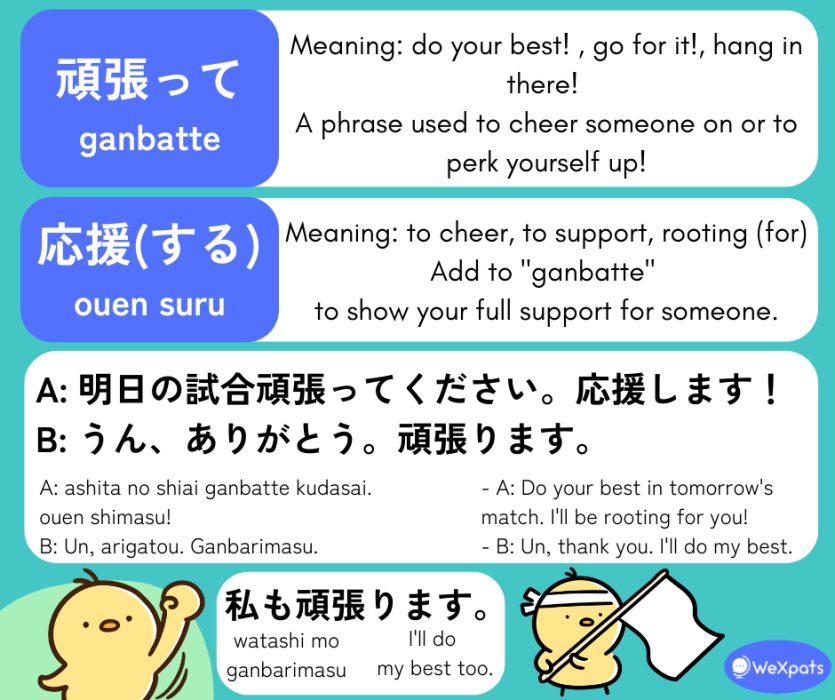
Any frequent anime watcher probably already knows ganbatte (kudasai), but take it one step further with ouen (shimasu / suru yo) which means “[I’ll] cheer for you” or “[I’ll be rooting for you]”. A whole conversation will look something like this:
A: 明日の試合頑張ってください。応援します!
Ashita no shiai ganbatte kudasai. Ouen shimasu!
- Do your best in tomorrow’s match. I’ll be rooting for you!
B: うん、ありがとう。頑張ります。
Un、arigatou. Ganbarimasu.
- Un, thank you. I’ll do my best.
It can also be used to perk yourself up and raise your fighting spirits.
こばと頑張ります!
Kobato ganbarimasu!
Kobato will do her best! / I will do my best!
- Kobato Hanato, Kobato
13. Itadakimasu・Gochisousama (deshita)
Itadakimasu,「いただきます」, is said before partaking in a meal. The correct way to do it is to clap your hands together and slightly bow down whilst clearly saying “Itadakimasu” out loud. At the end of the meal, gochisousama or gochisousama desu, 「ごちそうさま(でした。)」, is said instead also with hands clapped together and a slight bow.
The significance of this practice is to express heartfelt gratitude and thanks to not just the person who prepared your meal but others involved - the farmers who grew and harvested the rice, the lives of animals lost (your meat), amongst others. The practice of itadakimasu and gochisousama is taught in Japan from a young age by parents to their children and also during school lunch.
14. Ittekimasu・Itterashai
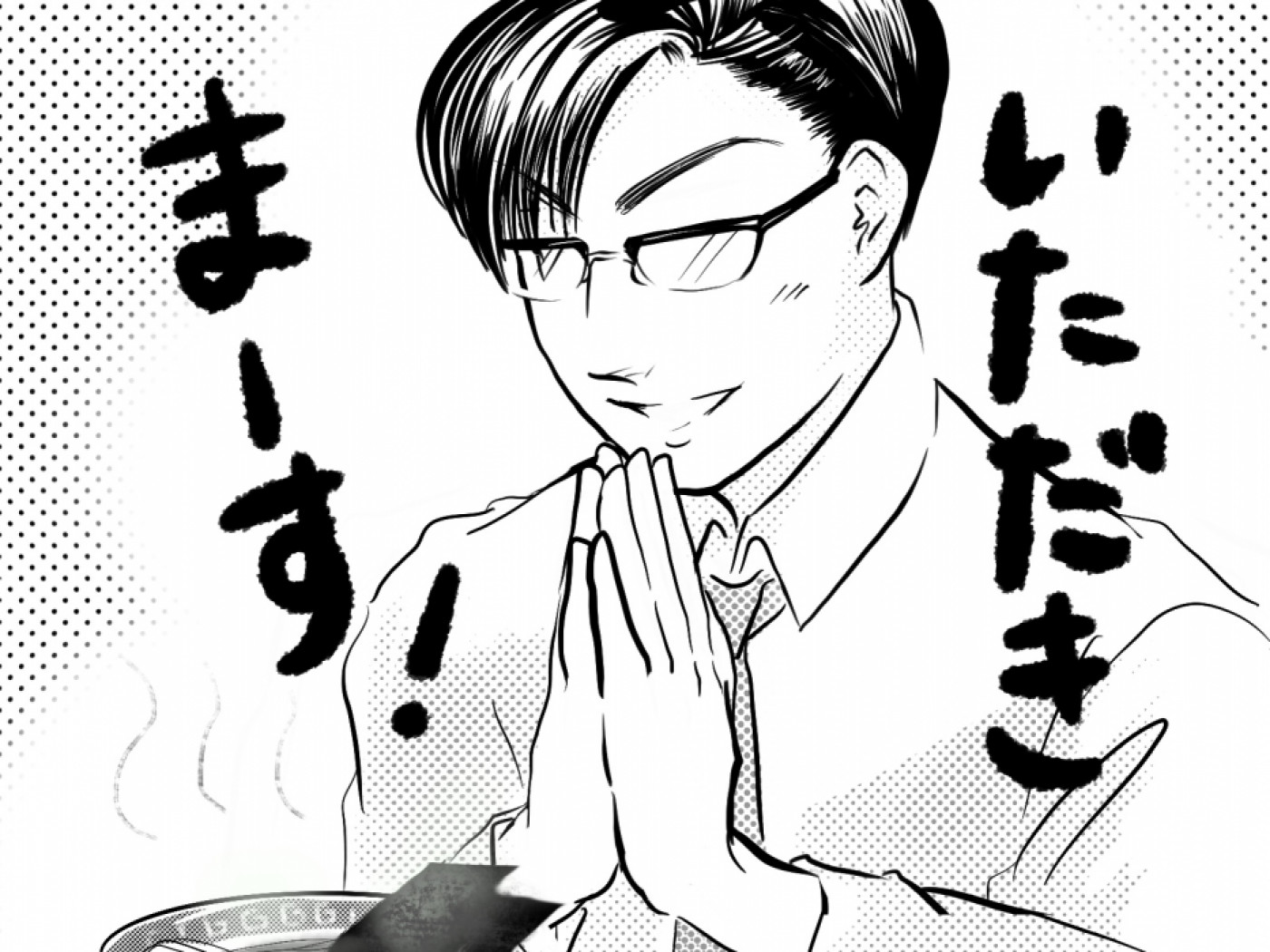
When leaving the house, you say ittekimasu,「行ってきます」that means “I’m leaving now” or “I’m off”. You’ll be sent off with itterashai, 「行ってらっしゃい」that means “Take care” or “See you”. Many scenes in anime have these phrases included as the character’s daily lives which is a pretty accurate presentation of life in Japan. At work, we also use it to send off colleagues leaving on business trips or going out to run an office errand.
15. Giri Giri Seefu
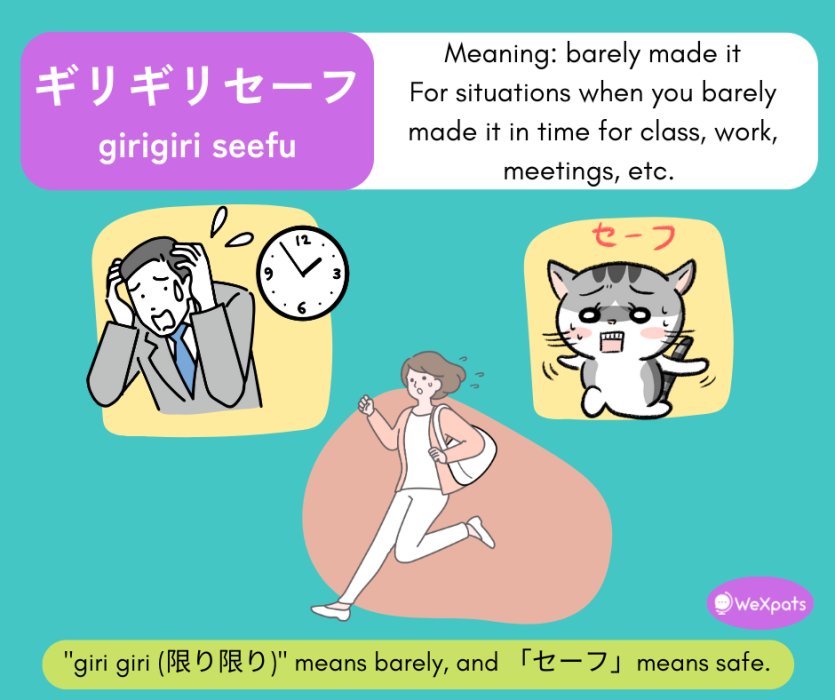
Very specific phrases for very specific situations. Giri giri seefu, 「ギリギリセーフ」, is used when you’ve just barely made it on time for class, work, meetings, etc. The direct translation is “barely safe”. It’s not a phrase you hear everyday in Japan but you do hear or say it when the situation calls for it.
Writer's Pick
5 Popular Anime Phrases Everybody Know and You Should Too
お前はもう死んでいる
Omae wa mou shinde iru
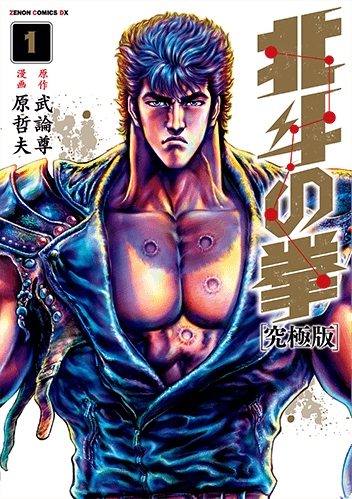
Image Credit: ©Buronson & Tetsuo Hara / Coamix 1983
An iconic phrase famous inside and outside the anime world, thanks to memes! The origin of the phrase that translates to “You’re already dead” is Fist of the North Star (北斗の拳 Hokuto no Ken). It is said by Kenshirou (ケンシロウ) who is voiced by Kamiya Akira (神谷 明).
計画通り
Keikaku doori
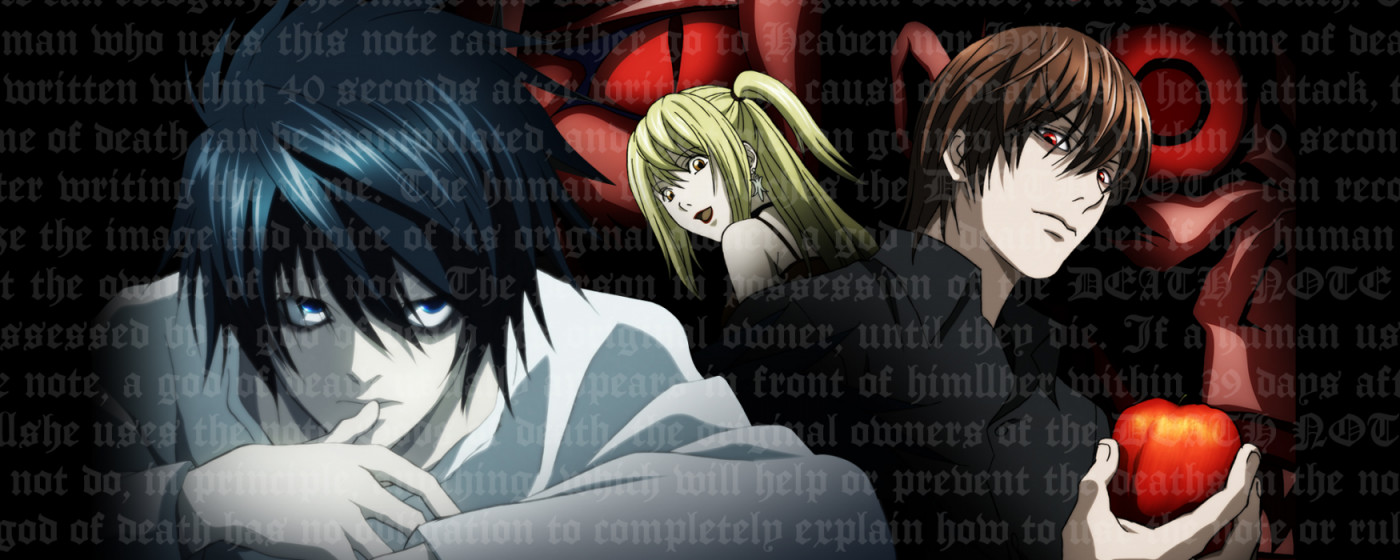
Image Credit: VIZ Media, LLC
A popular phrase said by protagonist Yagami Light (夜神 月) who is voiced by Miyano Mamoru (宮野 真守) in Death Note. The phrase became popular thanks to English fansubs of Episode 24 when 「計画通り Keikaku doori」was translated into “All according to keikaku” with a translator’s note saying “Keikaku means plan”.
Screenshots of the aforementioned scene became widespread and the translation accompanied with translator’s note was humorously repeated in fansubs of other anime where the phrase was used. In other words, it became a meme.
月に代わって、お仕置きよ !
Tsuki ni kawatte, oshioki yo!
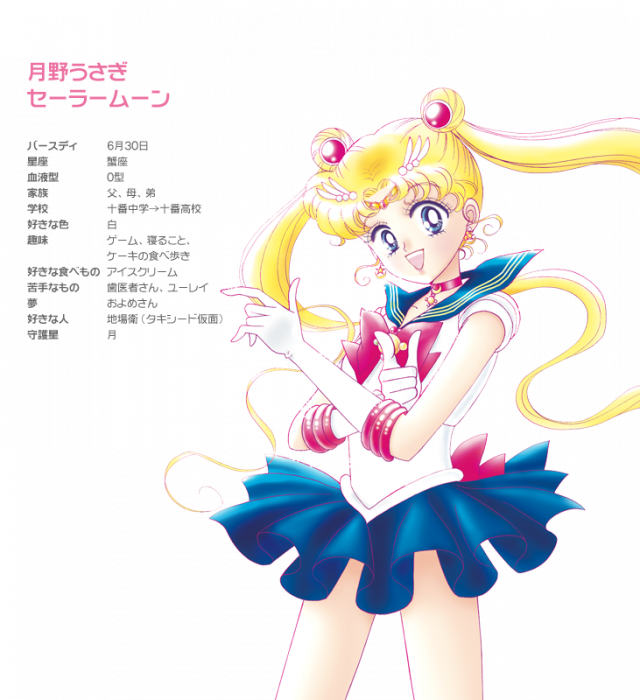
Image Credit: © Naoko Takeuchi / © 武内直子・PNP・講談社・東映アニメーション /© 武内直子・PNP・東映アニメーション and others
The magical words used by Sailor Moon Tsukino Usagi (月野 うさぎ), voiced by Mitsuishi Kotono (三石 琴乃), in the classic Sailor Moon anime. The phrase translates to “In the name of the moon, I’ll punish you!”
真実はいつも一つ
Shinjitsu wa itsumo hitotsu
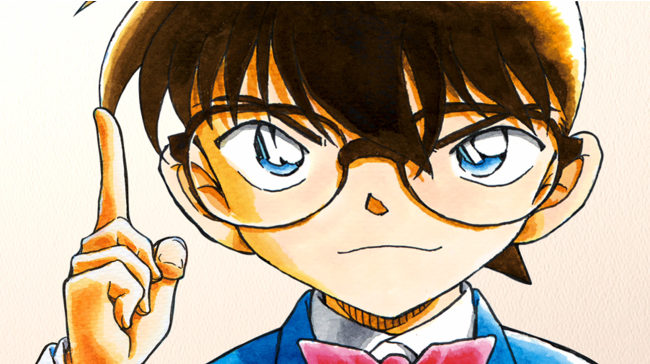
Image Credit: PR Times
Catchphrase by our favourite child detective Edogawa Conan (江戸川 コナン) who is voiced by Takayama Minami (高山みなみ) in the anime Detective Conan. The phrase can be translated to “there is only one truth”.
人は殺されれば死ぬ・お前の正しさは、ただ正しいだけのものだ
Hito wa korosarereba shinu・Omae no tadashisa wa, tada tadashii dake no mono da
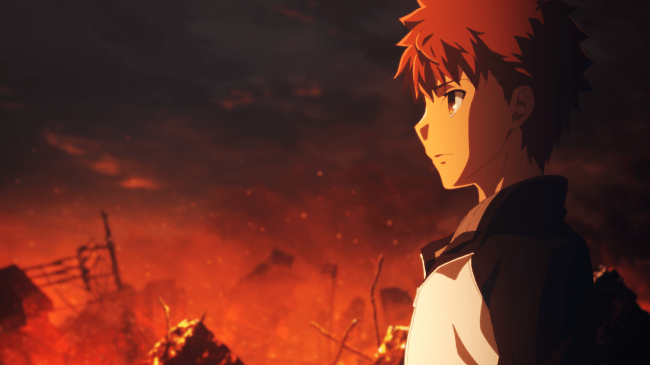
Image Credit: PR Times / ©TYPE-MOON・ufotable・FSNPC
Taken out of context and mostly treated as a joke, these phrases were said by Emiya Shirou (衛宮 士郎), voiced by Sugiyama Noriaki (杉山 紀彰), in anime Fate/Stay Night and Fate/Stay Night: Unlimited Blade Works respectively. The phrase 「人は殺されれば死ぬ」is famously (in memes) fan-translated into “people die when they are killed” and 「お前の正しさは、ただ正しいだけのものだ」into “just because you’re correct, doesn’t mean you’re right”.
Takeaway
N-Nani?! Sonna bakana!
And other common anime phrases are fun to quote and all, but keep in mind that not all phrases can be used in every situation. Some phrases can be too casual or even downright rude to say to your seniors, boss, or people you are not close to.
We do understand the fun of sharing random anime phrases and trivia, so our advice is to share them with close friends and especially anime-loving fans - don’t have any? Time to make some new otaku friends!
Not sure what anime to start watching? We have a list of 15 anime recommendations especially for Japanese learners you can check out.



































